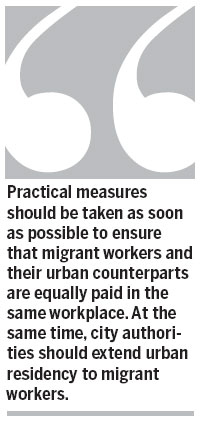Op-Ed Contributors
Equal rights for migrants
Updated: 2011-03-04 07:45
By Li Changping (China Daily)

Laborers from rural areas should receive same pay for same work and have access to same services as urban counterparts
Huang Shuhe, vice-chairman of the State-owned Assets Supervision and Administration Commission, recently urged enterprises under the central government's management to standardize the labor management of migrant workers and strengthen management of their labor contracts in a bid to protect their legal rights and interests.
His remarks were in response to the ever-rising number of migrant workers employed in China's major State-owned enterprises, which reportedly employ a total of 6.8 million migrant workers. However, employees in these businesses managed by the central government are classified into two categories - regular workers and migrant workers - and a discriminatory "same work but unequal remuneration" policy has long been applied, with the regular workers paid three to five times the wage of migrant workers. Migrant workers also suffer discrimination and unequal treatment with regard to social security, healthcare, education, training and political rights.
A large volume of overseas capital has been attracted to China over the past three decades seeking to reap the benefits of the country's demographic dividend. That has contributed to the country becoming the "world's workshop", as well as the nation's economic prosperity. However, the country's demographic advantage is to a large extent the result of its migrant workers. China's high pace of economic growth and prosperity over the past three decades has been achieved partly at the price of high labor intensity, bad working conditions, low wages and poor welfare and social security. This has resulted in a low sense of happiness among the country's hundreds of millions of migrant workers.
In 2010, the central government promulgated a document, stressing the country should try to transform migrant workers to urban citizens to resolve the problems. In its survey report published on Feb 20 on the new-generation of migrant workers, the All-China Federation of Trade Unions proposed that a collective wage negotiation mechanism be established to raise the wages of migrant workers. It also urged that practical measures be taken to expand the coverage of the country's social security network for the massive migrant work force, improve their housing conditions and extend them an equal hukou, or household registration, in the cities where they work.
Undoubtedly, the document by the central government and the federation's proposal, if effectively implemented, will be of great significance to the settlement of a series of problems facing these migrant workers.
However, if these major State-owned enterprises continue to adhere to the "same work but different remuneration", it will be counter productive to the country's endeavor to expand domestic demand. It will also aggravate China's dependence on overseas markets and diminish its economic self-reliance. In which case, the country's efforts to eliminate some deep-rooted problems underlying its domestic demand insufficiency, such as a disparity in income distribution, will be to no avail.
The prevailing system of migrant workers remains an important reason why the country's urbanization has long lagged behind its industrialization. China's modernization drive will achieve little if its urbanization fails to achieve substantial progress.
As the Lewis Turning Point is reached, the supply of new labor in China will decline, which is expected to increase the difficulty of meeting the country's ever-growing demands for labor caused by its rapid economic growth momentum and the expansion of its economic aggregate. The widespread shortage of migrant workers throughout China in recent years has underscored the severity of this issue. This tendency, if not effectively curbed, might plunge China's economy into recession earlier than expected. Giving migrant workers the same status and rights as their urban counterparts will spur the use of larger-scale mechanization in rural areas. This will liberate a lot of rural labor for urban areas.
To expand domestic demand and promote sustainable economic and social development, the country should launch a sweeping overhaul over its current system of migrant workers.
Practical measures should be taken as soon as possible to ensure that migrant workers and their urban counterparts are equally paid in the same workplace. At the same time, city authorities should extend urban residency to migrant workers within the territories under their administrative jurisdiction.
The country should also start introducing a unified social pension system for all workers, whether they are public servants, employees of institutions or those employed in State-owned and private enterprises.
The author is director of the Rural Construction Research Center under Hebei University.
Specials

Earthquake Hits Japan
A massive 8.8 magnitude quake hit the northeast coast of Japan on March 11,2011.

NPC & CPPCC sessions
Lawmakers and political advisers gather in Beijing to discuss major issues.

Pictures: quake aftermath
A massive earthquake hit Japan hard, leaving thousands dead.